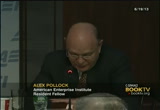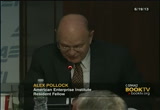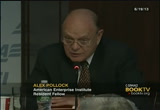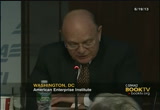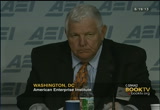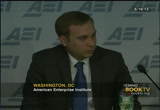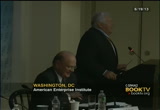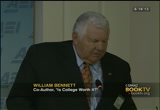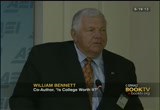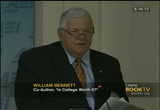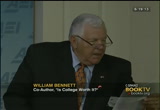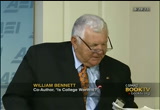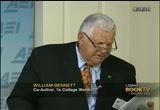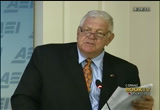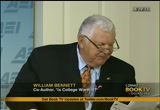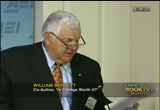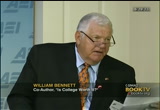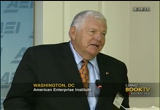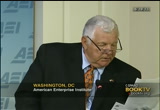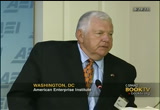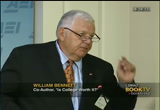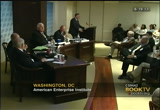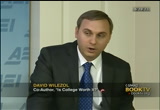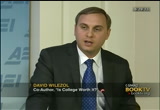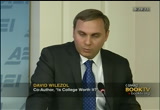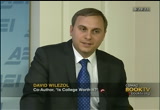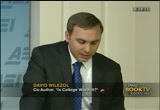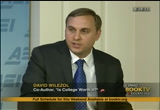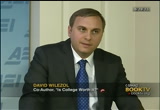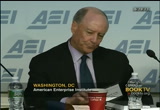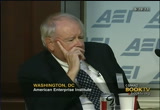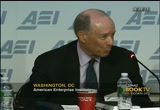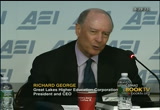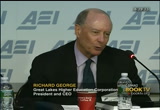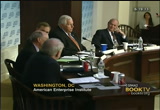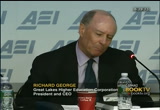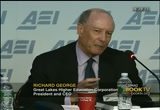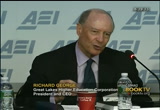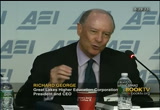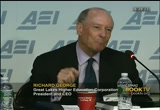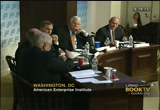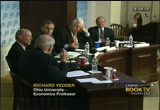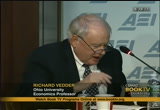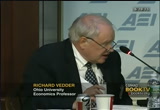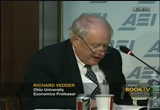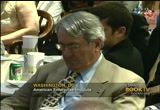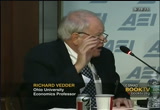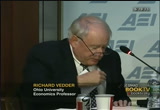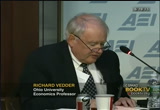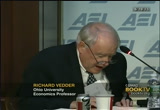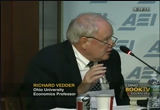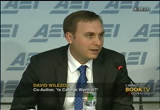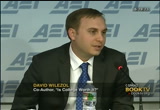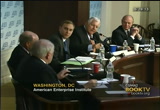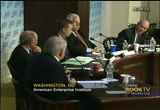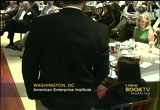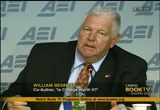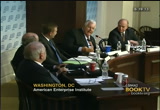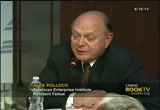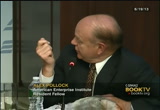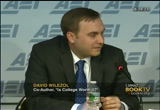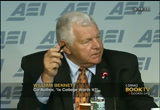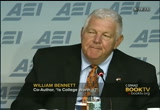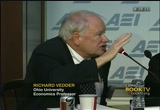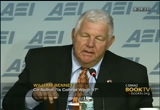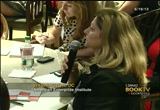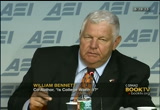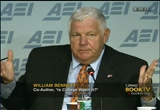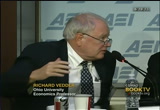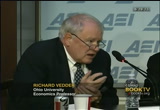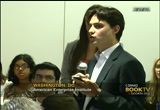tv Book TV CSPAN July 14, 2013 2:00pm-3:16pm EDT
2:01 pm
>> we are going to began and begin and we are delighted that you're all here. ladies and gentlemen, good afternoon and welcome to our book event. the new book is a great book. it is called "is college worth it." i am a resident fellow at aei and it is my pleasure to introduce the speakers were today. we are coming up on the 100 and 51st anniversary of the moral
2:02 pm
act, which was enacted on july 2 of 1862. one of the remarkable achievements under the lincoln administration in addition to fighting the civil war. landmark in higher education begins with an act donating public lands for the benefit of agriculture and mechanic arts. the public states have public land for colleges to teach branches of learning is related to agriculture and the mechanic arts in order to promote the liberal and practical education of the industrial practices in the pursuit of life. it seems to me that they knew
2:03 pm
exactly what they were about. that was back in 1862 and that may be less true for us today. we have gone from a society of where about one 40th of people went to college a society go. this obviously change is everything in the economics of higher education. and it seems to have produced a debt-financed group of bachelor degree holders. we noticed the parallels to our recent death of houses and condos when it comes to higher education finance. that financing is especially a problem and what is done is
2:04 pm
consumption and not investment these and many more interesting and challenging problems of collagen location knowing david, like the authors who want their work to be practical and useful, and i believe it will be. in addition to the discussion today, we invite all of you to be back this coming monday, june june 24 for our related conference and this will start
2:05 pm
at 9:00 o'clock in the morning and we hope to see you there. we will give the author is a chance to answer questions. we will adjourn at 1:45 p.m. for a coffee reception and book signing. the book "is college worth it" will be on sale is a advisory book and a chief evaluation and we have with us and advisor of the innovations.
2:06 pm
he has taught at boston university and the university of texas and harvard and served as secretary of education under president reagan. he is america's first to serve fighting drugs under president george w. bush. he is the host of bill bennett's morning in america and he and i were philosophy students together. he will be followed by the co-author and he is the associate producer of bill bennett morning in america. he's part of the manhattan institute policy blog and he is a fellow that studies in greek and latin at the catholic university in washington. in his honor i have tried to come up with an up or opiate
2:07 pm
latin quote for addressing student debt. i suggest that the latin phrase, happy if you have no no debt, is very appropriate here. [laughter] >> we look forward to the presentation of this provocative book and we welcome you. [applause] >> thank you. we were in the same class in philosophy and a final exams and we had saturday classes together. there are some basic familiarity is and i will hit some of the
2:08 pm
high points towards the end. one of the things we have said since the beginning is that two thirds of the people who graduate from high school and immediately mullen for your college take out loans and we talk about various options at community college, and military, other things, and we say this based upon what we have read, this includes 46% of people who start for your colleges don't finish in six to eight years. that is one of the reasons why we say it. there are other reasons as well. a lot of reactions to this book, some are interesting, some are not so interesting. but it has gotten a ton of reviews and we have hit a nerve and maybe a good debate will follow. one of the more interesting responses came from a guy in
2:09 pm
california who said i have triplets and we never been grooming him for stanford. having read in your book that the return on investment is better with harvard, we have considered that. the other was from a recent graduate of north carolina state university who said in a free what he said about the liberal arts is true. i finished before your program and i won't mention the college, he asked me not to, very well-known liberal arts program and he said that i realized when i was done i have learned absolutely nothing. he did not say that it was worthless, but he said that they have changed so dramatically. after finishing four years of the liberal arts college, he
2:10 pm
said that i then rolled as a freshman at north carolina state university in nuclear engineering and he graduated 25 years old he said he for your mistake, but i had a good time. and i said that i know that. that much i know about liberal arts colleges here. we had a good time. other reactions include campus forms on this, roundtables, other things, maybe the funniest one is heather wilson, who is a former congressman from new mexico and she wrote me from the south south dakota school of mines for which we have great praise in the book. she said please come to the winter commencement in rapid city. she said it's december 21, rapid city, and i said maybe not. [laughter] >> she said that we recognize
2:11 pm
the budget and i said that my salary is public information. $62,500. the average graduate makes $63,500. so anyway, if they buy me the boots i will go in december. the report shortly after this came out and go the main themes of the book and we were very good to hear that and we were delighted in the brookings institution when they said the following. college can be were that provided the student graduates and goes to the right school. this is very much along the lines that we wrote in an editorial that college can still
2:12 pm
be worth it for the right price at the right place and this is a major factor in making itself from the perspective of the individual. the institution report said this, that there is enormous variation in the so-called return to education including the field of study and whether a student graduates and post-graduation occupation. the average return is clearly positive and we emphasize that is not universally so. college may not be a smart investment and telling telling all young people to ensure cost amount of light, which is this kind of message, we are actually doing some of them a the major service and that is pretty interesting. second quarter i would make is we talk a lot about science and
2:13 pm
technology and engineering and math jobs. we say that this takes place as outsiders and which one is more pathetic in terms of getting a job after college is a tough competition. i returned with my phd in philosophy in which the jobs bulletin board and the only thing that there was a notice from the department of labor about minimum wage, which you are entitled to. it didn't look so promising out there. i said harry doing, he said fine. as i got my phd here. he said how's that working out for you. and i said fine, her radio show. he said well, that's good. i guess that is the dialogue in a certain tradition, and i said i hope it is. anyway, we talked about some jobs in the book because they are the jobs it seems that are
2:14 pm
very much worth it and we based some of the conclusions we came up with on return on investment findings from the year 2012. the 2013 numbers are out as well and this has shown that the pattern continues. the top 10 petitions are all technical institutions or institutions that emphasize or have a strong presence in science and technology and engineering and math. caltech and stanford are very strong as well. another report shows that one in 10 jobs in the u.s. economy are sub bachelor's degrees, which
2:15 pm
are s.t.e.m. jobs. $53,000 per year is the average salary. real life example, edwards noted. we are not recommending him for traitor trigger of the year for hero of the year. he had no college degree, he had no high school degree and was getting paid $200,000 per year for his technical abilities. in this upper stratum of pay scale rankings with heavy s.t.e.m. focused on the highest was harvey mudd, small engineering school in california. they earn about $2 million more in their lifetime than they would have earned with just a high school education. 2013, a member of the
2:16 pm
prestigious private school yale slipped, if there is a pattern over time i would attach significance and there's a pattern over time. places like the colorado school of mining is growing, for instance. so that is where it seems to be where the opportunity is now in the foreseeable future. and it's something we have pointed out in a book, but it is true. although there are 50% more students enrolled in college than in 1985 there were more grare were more graduates in 1985 in the arcane field of microbiology and
2:17 pm
chemical engineering and computer science. here you have a dramatic increase among students enrolled in college. tremendous opportunities in these fields and you have 50% fewer graduates in these fields. i have some notions and how we teach sciences and math, but that is an extraordinary number. everything i want to say on a hopeful note is that we say the end of the book that we think that technology and the internet and other things can have a transformative effect on how the evolution may be coming and we talked about some of the programs to which i am a senior adviser to. on the whole, and not long after our book, it was announced and some of you may have seen it, but georgia tech is now offering a totally online masters degree
2:18 pm
in computer science and the price tag is $7000. easter be $40,000 from state, $20,000 for in-state. $7000 is the price a student will pay and this is a prestigious university. first-rate program, there you go. this could be part of the future. let me just finish as i make room for david and our distinguished panel. want to hear what they got right and wrong. a few of the facts we have talked about which people have found interesting. 40% of students under the age of 25 have student debt. the average total amount is around $20,000, which is tough when you're just starting out.
2:19 pm
they're 115,000 janitors with a bachelors degree in the united states. the study found that 45% of college students made no statistically good things and complex reasoning and writing skills and the first three years of college grades were you paying for. this is kind of a big question. what is the value added here. the academically engaged maters found that the average college student with only 12 to 13 hours per week study outside of class and what are they doing. do not answer that. our secretary of education and went to france and met with the minister of education and we are talking. he kind of slightly had his nose up in the air. he didn't think that as i was insane. he thought i was the security. something that has happened to me throughout my career. i said good morning from how your students during and he
2:20 pm
thought that if it were your students doing. and he said it is 10:00 o'clock and they are all reading. said what are your american students doing and i said god only knows. we have a decentralized system. many are in recess right now. anyway, another thing we talked about, and this is so much as about faculty and costs related to costs and overhead. what i did my phd, 50% of the credit hours were taught by only 20% of the faculty. this has gotten a lot of people thinking. we have heard a lot of people about if this is generally true. the answer is yes, small part that he teaches the largest part of the student body.
2:21 pm
the median graduate is nothing more than the median individual pirate. you can survive williamstown, you can survive rapid city, i think. in 1970 -- and this is -- to me this is a thing something we have engaged since the book came out that has been kind of the toughest night. this is the one that people have gotten angry about and that we have had some back-and-forth about. because you know when we talk about the price of higher education, the answer you get most often include -- that's the price of excellence. well, that's just not a good answer because a lot of places have brought excellence and a
2:22 pm
lot of have not. some have gourmet room service to the dorms and others have not. second thing we have heard is that the price goes up and we charge the wealthy students were money we can give more money to the poor kids so they will come. as best as we can tell, they will know for sure in in 1970, something like 12% of recent college graduates came from the bottom quintile of income distribution. forty years later percentage was 7% in this whole notion that we charge more we can give away more has not worked. this was combined with a marvelous "new york times" story which indicated how it we are not reaching the extremely talented poor kids even with
2:23 pm
enormous budgets -- recruiting budgets in higher education. anyway, we are very pleased with the way the book has been received. we look forward to conversations about it. we look forward to changes as well in education. many of which conversation has begun to turn to. thank you very much. [applause] >> thank you, bill. let's hear from david. [applause] >> thank you very much. i wanted to thank everyone for having me. i'm sitting on this distinguished panel with a couple of man with decades and centuries of experience either that or i'm the best looking guy
2:24 pm
on this topic in america. [laughter] >> i want to talk about what it means for millennialist, especially. because i'm one and i think this is something useful from a generational perspective. in college graduates are struggling with students loan debt and unemployment even as the economy has improved in the last couple of months. the major consequence is the inability to get married and have kids and buy a car and things like that. there's a lot less room to achieve a lot of the aspirational goals for people of my generation and people who are saddled with this kind of student loan debt. you can look at a couple of numbers that tell the story. a survey said that one third of millennialist macgregor called him and said it would be better off working and earning money.
2:25 pm
half say that that is their biggest financial concern with 42% calling it overwhelming. 35% under the age of 30 or more than 90 days the week went on student loans and the average graduate in 2013 had a debt burden of around 30,000 dollars i think the median debt burden was $14,000. that is still a hefty sum of money to be burdened with when you come out of undergraduate school. in new report from congress on that student loans have increased from $550 billion in late 2007 to just under $1 trillion in 2013. in only six years, five years we have double the amounts of indebtedness in this country and with pretty bad effects. the major culprit begins with the schools themselves. i think they are capitalizing on a prominent social belief in
2:26 pm
order to make it in the labor force as a worker and a human being, you need a college degree and it's all but essential. i think the speaking from experience, an anecdote is not the beginning of data, but i see people and i know people and i meet people who don't have a college degree and they will attest it is generally that there is a feeling not only in themselves but a perception by other people that if you are without a college degree a must have in life and that i think it's not a good thing and i don't think that is america. so schools can raise prices to capture students who can pay full price and the very top schools, they are always going to have a huge amount of demand for people they can jack up prices as much as they wanted people are going to pay that because that brand is synonymous with achievement in american
2:27 pm
life. what has happened is a lot of second-tier schools have followed suit and they also have raised their tuition to exorbitant levels that most people cannot pay. george washington university, i think, it is one school that i think is kind of the exemplary of this. is the most expensive school in the country but nobody would say that it's of the highest quality. but it is capitalizing on the believe the price is synonymous with quality. so if you are a parent or student who is uninformed about the process and you see that anything i send my kids there, there will be a great shot on a high level of achievement, and overpack there a lot of kids coming out with huge amounts of student loan debt. they sink it into expensive
2:28 pm
building projects, rock climbing walls, things like that, which are fun, i went to american university and i'm not going to lie, but in truth they were very own essential to the learning process and i think i would've been happier being less than dead and having a less nice going or cafeteria or something like that. lastly they play game with financial aid for low-income students, which is at some time very despicable. anyone who basically wants a student loan in america from the federal government can get one and knowing that that is something that the schools like to do, raise their prices and don't have a lot of compassion about doing that. i think that is a big area of hypocrisy because we know that philosophical motives of
2:29 pm
colleges today is social justice and fairness and things like that. a lot of these very moral perspectives in bettering the world and that is fine. but if you're going to hold two notions of economic and social betterment as tightly as universities do, you better be prepared to be honest with students when they are ready to sign a $20,000 promissory note for your student loans. i think that that is exploited to say the least. pointing out some statistics, i think this is an incredible study that just came out. it talks about how grant recipients at some of the nation's best colleges and they say they will give you money and they enroll low-income students. but what we're finding is that a lot of the students, school indebted. so boston university 15% of the
2:30 pm
students are those families who make 30,000 dollars os or less. they are still forced to pay $24,000 out of pocket or in student loans. santa clara university was the worst offender at 15% of low income and they are paying an average of $46,000 a year out of pocket between student loans and out-of-pocket costs and that is ridiculous. the consequences of all this beyond each individual's financial state and not being able to get married, have kids, buy a car or what have you, i think we are creating a class of citizens that are alienating and dissolution from the economic system. they feel like they have worked hard and done what they are supposed to do, they have made an investment that a lot of the student loans are sold and it can be.
2:31 pm
i am not saying that student loans are never a good idea because it can be. but in light of looking at the last election of income inequality, economic fairness, i think this needs to be a part of that conversation or republicans or conservatives. a lot of scholars have done a really good job of talking about that as well. so in conclusion, yes, college can still be worth it at times. but it does depend upon what you are studying and where you're going and things like that. but i think that it is important to recognize that the kinds of people that we are turning out of university system not only -- you know, not only economically but cynically as well. we are creating a class of people that is not going to cohere as citizens, perhaps, and
2:32 pm
they are missing out on what america is really about. thank you very much. >> thank you, david. we have two expert individuals and first is that george, the president and ceo of great lakes higher education corporation and he has been substantially involved in public finance and secondary educational finance since 1972 and he is chairman of the wisconsin covenant foundation and director of student loan administrators imperiously a director of the national student clearinghouse and was a principal negotiator in 1992 and 1998 and 2007 of the u.s. department of educations negotiated rulemaking committees for student loan programs. he is also a consultant and as a
2:33 pm
director, i contact attest to his creative insights into the issues that we are addressing today and i hope you all pick up a copy of his proposal for higher education finance in the reception area per second guest will be interesting was professor at ohio university. port ability and productivity. harry doing on that? >> okay. >> he's an adjunct scholar, which previously served as a member of the department of education's commission for the future of higher education. he has written widely on american economic history and the american economy and historical perspective, and particularly with respect to
2:34 pm
today's subject and issues, the book going broke and why college costs too much. going broke by degree is a two book set that we can have everybody back. he is also the author of numerous scholarly papers. and i should mention that this congressman had hoped to join us today, but he is caught in a markup and so we will have to look forward to joining the in the discussion which will certainly be ongoing and other occasions. >> thank you. thank you for having this event. i have to say to bill and david that i thoroughly enjoyed the book. and i think that when you look
2:35 pm
at the overarching issues and fundamental issues of societal benefit for individual benefit, the answer to the question determines who should pay, whether it should be the public or the individual beneficiary. a second overarching question is what is the purpose of postsecondary education. as a class comite meant or trade. i think both of the issues are grappled with mightily in the book. and i think that anyone who wants to understand where we need to go in postsecondary education, driven by the answers to those questions need needs to read this book and it is a
2:36 pm
compilation of much of what those of us that are practitioners in this area have seen in the past, but it doesn't ask for the job of bringing together and documenting it and anyone who wants to do research, particularly the notes in this book include a real transcript of much of what influences the debate. i was taken by the book in terms of the second overarching issue on whether education was for classical enlightenment or training. between 11 survey of students were 80% of the students responded that their principal interest and purpose was training and job opportunity.
2:37 pm
that tells us again that a lot of who could be considered most appropriate should be the individual or should it be that prospective employers are going that are going to be the beneficiaries of that training. and as i said, i think in dealing with any of these questions, this is an excellent primer and i commend it to all of you and i also particularly agree with something that the book touches on several times, and it's really the fundamental issue of whether colleges worth it. the answer, of course, is yes and no. both bill and david have told us this. it depends on where you go. it depends on what you study and what your preparation is and what her motivation is. what we see is a differentiated
2:38 pm
space and post secondary education. yet as the book also clearly points out, we have a monolithic system that addresses a particularly in the context of financial aid. i won my mark in turn remarks by focusing on the student programs and i should say that all of my comments are my personal observations and as a board member, i am making this disclaimer so that nothing is said on behalf of great lakes. but nonetheless, just so all of you understand, we service over $150 billion in student loans for over 6 million borrowers nationally. we see everyday what this debt burden means that america. it is a picture that is not particularly attractive,
2:39 pm
unfortunately. much has been said about college cost increases and how they have outpaced inflation significantly, but more important are the is income growth and that is simply an unsustainable course and that will lead to continuation of the problem that we see, particularly one that is outlined in chapter two of the book. i have one criticism, it's that it only touches briefly on one of the significant moral issues that underlies the problem of student loan debt and it is the unheard voice that is rarely focused on the overwhelming majority are those that have not
2:40 pm
completed their education or degree or credential. and unfortunately the overwhelming majority of those defaulters are also our most vulnerable cohurts. first-generation students and low income students. the broken system and the idea that everyone has that post secondary education, what this does is it gives concept to free education. everyone has gone to post secondary education, and we force underprepared students to pay for that, we have given life to free public education in this country and when we do and we create an enormous pool of defaulters who are nonpersistent students who then you lose contact with because you haven't put the resources into this, we
2:41 pm
cannot help those defaulters with the tools that are available. so we need a student loan program in the context of a financial aid program where no one should be allowed to borrow until they have demonstrated preparation capacity to persist. it is cheaper for us to make enhanced grants to those most vulnerable than it is for us to make loans in and pretend we are going to collect on those loans or put those loans into income-based repayment or in contention for payment or any other of a host of variations because the reality is that it is cheaper for us to make this grand than it is to make this income contingent loan is forgiven sometime in the future.
2:42 pm
schools need to fund remedial education and we need programs and other institutional aides so that others don't borrow until they are able to demonstrate the capacity to process. at that point and we need differential underwriting of the loans so that we match with the capacity to pay will be in the future and we are willing to commit about education. that is the only way we are going to get complete transparency. it won't be by having a new information sheet for new disclosures. it will come about when the provider of the capital tells the individual student that this is how much will be made available to you based upon what you intend to study. because this is the anticipated outcome based upon that. that will get us transparency.
2:43 pm
so if we can combine grant funding and will transparency, we can create a student loan system that will fundamentally change how postsecondary education operates today. it needs to be done. it needs to be done now. we have the resources to do it. if we look at the money that is spent in tax benefits and the existing student debt, there is more than enough money to do it. it just takes the well remediation of the program. [applause] >> thank you.
2:44 pm
>> before i read the new book by bill and david, i sat down and listed what i thought were the three biggest slipups of american education. my first shortcoming, not surprisingly, was american higher education is extremely costly and inefficient and burdens students and leads to a student death debt crisis amerin education involves little women with teachers and students and even buildings being grossly underutilized. many students fail to graduate from college and to many that do are not much better critical thinkers or require much more knowledge or virtue than they did as freshmen. third i think the overproduction of college graduates and related
2:45 pm
topologies, such as students majoring in topics of little relevance has created massive underemployment and caused a general decline on college education. then i read that his college worth it. interestingly, the authors reached exactly the same conclusion as i did. making me wonder why i wasn't the coauthor. [laughter] i was excited for the book. [laughter] >> the evidence is overwhelming and with my way of thinking, it is irrefutable. colleges are costly, students are learning too little. the employment prospects are
2:46 pm
increasingly dismal. i like most about the book is the way it is written in the audience to which it speaks. it makes the factual case convincingly but literally, using a non-technical writing style that the moderately literate citizen contemplating attending college can understand. it is filled with some of the tragic result of higher education shortcomings, such as individuals living in their parents basements with seemingly awful albatrosses around her neck. the authors think the current situation is unsustainable and a big changes coming to higher education. early indicators already point to that.
2:47 pm
in 2004, 60% of those going on to college went for your schools. eight years later, that had fallen by over 11 percentage points to 57%. for your colleges are too costly soap people are starting to look to lower cost alternatives. in 1970, less than 1% of our nation's taxi drivers had a college degree. today more than 15% do. on sunday a washington dc taxi driver, which is to say a nonrandom sample, a taxi driver said that he had a bachelor's degree from georgetown and more recently a nursing degree to be become an rn but he can't get a job in either of the areas that the study then. so he is driving a cab. as stories like this become more
2:48 pm
and more common, prospective students are starting to turn away from traditional higher education in spite of the propaganda. you don't need a bachelors degree to drive a taxi or mop floors where there are 115 bachelors degrees for the janitors that bill was talking about. many mediocre liberal arts colleges and secondary quality state universities increasingly face the prospects of extinction creative destruction is coming to higher education and bill and dave make this point beautifully in this great new book. i think higher education reform will revolve around three words.
2:49 pm
information, and innovation. much reflects massive information gaps which bill and david are trying to help fill with the book. colleges are notoriously reluctant to provide information about themselves. colleges have lacked incentives to make cost reducing changes that typically involve innovation. federal funding has fueled this and puts a premier on spending money and lowers productivity instead of reasoning. as traditional higher education loses market share, what will be substitutes for traditional schools? new technologies and promised to reach what is called the wal-mart honda civic segment of education. those who want high-quality
2:50 pm
learning at low price. there are some trade schools offering vocational training in specific schools that are booming and we need more electricians and welders and long-distance truck drivers. if you are anthropology and women's studies majors. education is both an investment and consumption and many will survive and also protected by vast endowments. it is a lowly private school with marginal reputations similar counterparts in the public sector as well. plato allegedly said that necessity is the mother of
2:51 pm
invention and even in the short months since they finished writing their book, new ideas are evolving. only yesterday the educational testing service announced it was creating a proficiency profile and an electronic certificate offered to those doing well on the test that assesses critical thinking and reading and writing and mathematics. a second certificate will be issued to those on a digital technology related test. employment is evolving and certificates that cost $100 or $200 instead of the prevailing 100,000 order $200,000, you cannot do with everything. this is not a book that want extensive critiques. a more comprehensive treatment
2:52 pm
of the elements of higher education would deal with some of these issues. women mention that there are some things we don't talk much about. first, the majority of professors are doing research of subnational use to anyone. nearly three papers are published daily on williams shakespeare, for instance. why is our? why not incentivize professors to teach more. second, the reason browbeating of a for-profit college has been excessive rules being proposed that it extended to public institutions in the closing of hundreds of public schools. it owes its existence to the financial aid program and it does have something of an even record of a congressman. but it has proven itself highly
2:53 pm
efficient in delivering decent quality education for both conventional and electronic means. we hope they will play a significant role in higher education it is something that our authors go on about. the errors are nonexistent. this is a marvelous book. quite frankly not quite the equal or even the king, but it's pretty darn good do not walk to
2:54 pm
your bookstores to get your hands on this book. you will not regret it. thank you. [applause] >> thank you. thank you to all the panelists for this great conversation. >> i think one thing that was alluded to is that everyone feels like they need to get into college because of the k-12 system that is broken. i don't think we have to look too hard to see that our test scores have remained flat since the early 1980s and the lot a
2:55 pm
lot of minority groups have underperformed significantly as well. if anyone remembers around christmas time, there was a commercial done by target and there was a montage of students opening of a college education for college acceptance letters and in fairness it was very touching and they were all celebrating wildly. but then it flashed upon the screen and said every kid deserves his chance and that is why target is giving $1 billion to higher education by 2020 or something like that. my reaction was, well, why aren't we saying, okay, every kid deserves the chance to graduate high school and get a good job. i think we have moved on and a lot of people -- people in america, i don't own education policy, but in america in general, they have moved on from the idea of redeeming and
2:56 pm
reforming k-12 in a way that i think now, especially with the rise of technology and blended learning that we can do, i think that that is one thing in particular. >> thank you. bill? >> i think the system is fair with the exception of intercollegiate sports. i will be spending part of my fall at alabama texas a&m and i am sorry. but there are serious questions here. we can talk about that and one question that you may know the answer to is overall, due intercollegiate athletics, do they drain or bring in money? >> at the big ten universities, the schools using a narrow
2:57 pm
accounting framework, arguably with some of the spillover effects, the problems are at other schools in the total subsidies by the ncaa definition, it is 2.3 billion and it's not a huge item. at some schools it is a thousand dollars that the kids are paying and that is a pretty big burden. >> i just think an education, it might be better than you get in most sociology majors before your. >> no argument with me on that. >> and the other further points?
2:58 pm
>> okay, ladies and gentlemen, it is time for you to be able to ask questions and let me just remind you of how this works. please wait for the microphone to get to you and tell us your name and your affiliation. >> hello, i am with the eisenhower institute and i am a small liberal arts major here in this discussion i definitely have understood a lot of these points i know that that that is coming to me in the next 12
2:59 pm
months but i'm wondering about some of the values that i have gone from college education including critical thinking and personal relationships and kind of these experiences that rather than just. >> and you decide that you pay your money and take the choice and we have a better informed consumer and i went to williams college and bought a lot of money, went to graduate school and majored in philosophy and i had a $900 stipend and a one mill a day, that's all i could afford and i fell down on the
3:00 pm
3:01 pm
they don't give out value for the dollar. the opportunity to get a good job for the most part and if they want to take the high road and to say that this is to save your soul and enlarge your mind, start trying to save souls and enlarge minds. i don't think they do. that another top kpik different place. the ammenities that of the to beginning of the life itself. i mean. i just could not get enough of literature and floss fement i was willing to pay, and pay for years. but you know as long as you no he what you are get examining they are being honest. one of the things that you hinted at both of you is the catalog copy and the irony as richard points out. by the way. we will make it higher education worth it? vedder guy higher education would that be right? into the better guide or vedder guide. either one. is for all of the information that they put out often they do not tell the truth.
3:02 pm
and that is you know, i this i that most of us. if we had been told. we are majoring in philosophy you will not get a very good job. would have done this anyway. many of us would have said fine, i am an inthinker and philosopher that is the bravado of the 19-year-old. but okay. you know, candor. going into it with your eyes open. the catalog should stop lying. >> the importance of what bill said i have a marvelous memory when i was a floss is fee student of the surgeon and head of the state medical source site that one day would be my father-in-law. coming in where i was waiting to pick up his daughter for a date. and saying to me in a casual way, well, what do you think that you can make as a philosophy major? [laughter] it was affair question. i didn't care in those days,
3:03 pm
i fully agree that the key thing is to know what you are doing. we mention parallels to housing. bubble and the college cost bubble. they flow of c in both cases with great good intentions from the government into the sector. both housing and colleges have pushed up the costs. and in both cases. the most important thing is to know what you are doing in talking about mortgage loans. i always tell people that who is making most important decision about getting a mortgage loan is not the lend or, the lend letter under write you. and vastly more important is for you to decide and to know what you are doing and if you want to like bill. if you want to eat oatmeal and hot dogs for ten years so you can pay for the house of your dream that, is fine with me, if you know what you are doing the point that you make bill about college is exactly the same and exactly right. the question over here. please.
3:04 pm
>> good afternoon. quick question here, side question would be is college worth it for those that are entrepreneurs and business owners? >> if you know what your career will be and better off in a trade environment or high-tech business is college really worth it? um. i this i that will this is up with of the great calculations of becoming an entrepreneur. will i forego this experience to do that one? life is often best teacher of those thing and i think that this is absolutely true when starting a business. and build ago business and things like that. and look at steve jobs and
3:05 pm
mark zuckerberg, bill gates there was no value added for college. and i am sure that there was thousands of individuals across the country that is he the same thing about themselves and had the next big idea and maybe it didn't pan out. so in one sense, college yeah. maybe a great fall back if your idea is to be a computer programmer at google or apple or whatever and have a great career. you may not be the next great silicon valley entrepreneur. so that is a calculation. >> a couple of things. one. we do talk about the book. this is a i don't know how much of a model it is for so many people. but the founder of paypal set up. he recruits the top two high school students in the country too. like harvard does and pays them to come to work with him. and the other students. what hundred now? >> a hundred and they get paid to go. they do not pay.
3:06 pm
they get paid to go. and make the deal where the company gets a percentage of what they the young people make as a result of this experience. and it is an interesting idea. one anecdote. that david ones to tell quickly. after graduate school. same you will containously, going to harvard law school and i was a proctor, i live in the dorm. and aed divides students i was known as the stay in college proctor. and people were disaffected and wanting to go, to leave college. and i was the one better off to stay. when one of my be from men graduated and went to medical school and he had freshmen that wanted to leave. one could not talk them into staying. john asked me to talk to the young man. gates. bill gates. i talked to him. i talked to him. and he just kept on saying there is this thing that i want to do. and in frustration, i said. let the dope go. you know. [laughter] .
3:07 pm
i fought a good argument. if you are smart. will you make it smarter. and make the idea better? surrounded by the brightest young people in the country. and a good faculty? that this is something that i want to do on my own. good luck. never hear from you again. >> rich. your thoughts on this? >> well, i don't know of any mark snyder might. have an empirical evidence. that is a hard question to answer. this is a world where there is risks associated with anything that you do. i do think that there is a class of people for whom with the entrepreneurial spirit and entrepreneurial drive and high levels cognitive abilities to begin with. that could thrive outside of the traditional college environment this. is not for everyone and it is for a few. and remember most entrepreneurs will not really succeed this. is a high risk venture. >> it is probably true here,
3:08 pm
at aggregate with the entrepreneurial adventures is the aggregate. some people will have to be able to make it big. bill. go ahead. >> we have the curve here. actually the bell curve. any standard will work ill to be conjoined with that and any standard will work ill and not to be much use if you pose universal genius. the zuckerberg, gates. jobs. it works anyway. madison did not learn at all. princeton. madison knew a lot and read a lot. the book is not written for those folks. arguably, i think based on the evidence of what i could tell from reading the jobs book and the other pro files of successful people. issue live in a ranch house in california use your garage to play the guitar or invent machines and you will make it much more likely than college. >> i this i that may be true. questions here?
3:09 pm
just kidding. >> my name is fat another. i want to thank you all for being here today. and making this presentation. via question for bill ben. by the way. also a ut alumni. welcome hook 'em horns. >> two questions for bill bennett. talking about the liberal arts education and how it is changed and i was curious to know how it had changed? and how do you think that this is impacted students in terms of their ability to get a job. and my second question is that um. you seem to in my opinion over emphasize the he can no many i can benefits of an education. but under emphasize the ability to think critically with within my humble opinion is the primary reason foregoing to college this. is important to you know. make a living too you know, we all live in the real world and have to make money. but i this i that the ability to think critical would elevate our society to
3:10 pm
a different level. >> and the second question is for -- richard. >> that is those all of the questions that you get for the moment. bill? take that. >> i want to ask one other panelist a question. >> way. i will be back to you and okay. >> bill? >> very quickly the so based narrowed. professional ideas. and deconstructed there is very little left. we had the sense when we were studying shakespeare neil mcgaugh's course in drama and philosophers we were engaged in critical thinking we were learning to think big about big questions. our thinking about these things would help us in the world. we would not think that we could make up any texts that we wanted and we were engaged in this great enterprise. about life. and that way we entered into a dialogue and you did not just do fancy foot work but
3:11 pm
you left the dialogue a different person based on this. this is if i ran a college, i would not let people just major in anything that they wanted if it was my college you have to pass through certain things and certain books have you to read because you will be an educated person i believe in that. then i would not have a catalog that says that you can hit the stars. you can do it anyway that you want and major in anything that you want. and borrow as much money as you want. and that would be a lie. >> the second part was emphasizing the economic benefits over critical thinking. richard commented on we sit in the book. the customers say that they want. if you wish to run a college st. john's college. find. and you will read all of the great books while you are hear too bad that is the way that we do it. but it is will will% of the students if this is their
3:12 pm
number one priority and you present yourself saying that it will get threw man. then get them there or be more truthful. and be more truthful about it. >> you know. have you a fast question i think for mr. george. >> i do have a fast question for mr. vedder. why do you think that women studies programs do not have value? >> i knew it would be trouble with that one. i didn't say this they did not have value but that people graduating in women's studies. i think that bill and david and the book. they have empirical evidence from pay scale.com women's studies againer studies graduates. latin american studies graduates do not on balance earn a lot of money. that doesn't mean they have no value. there is both a consumption and an invest valued in a
3:13 pm
higher education. you can go to college for as many years as you want and take courses in you know, i study french literature for a year in france. it has done me no good vocationly, i am glad to do that if you want to major in women's studies or fine there. is a public policy issue of our graduates that are not. are they being deceived and thinking that they will earn money? there may be even a public policy issue that the policymakers want to discuss on oh public subsidies will make on private consumption. whether women's. studies and basketball, anything else. why should the government be paying for people to live consumption dream. when they do not do this for a joke. of pack or a bucket and whatever. the guy that has a lunch bucket and works in the steel mill. we do not do anything for
3:14 pm
him. why do it for the college. yuppies. wait for the microphone please. >> hi my name is adrian. ceo and modern mentoring for college and high school students and entrepreneur stanford grad. i am not sure how i am informationed in front of this panel. i wrote down my question. knowing that colleges are slow to adapt but students will still likely go to college, at least in the near future, what is in your opinion the best way to maximize the return on the college investment. and whether students will need to take a very different approach to college than parents in terms of the focus of practical skill acquisitions and job placement. and what is the rolf career prep at the high school level to allow students to be more empowered in figuring out a way of a lining that general education system towards the end and career goals. >> i will give dick george a
3:15 pm
chance to attack this one. >> i this i that one of the things that the book end with is the impact of technology that they will have on the transformation of the academy. and think that clear if we can fix the creditation which is the broken as the fm aide system itself, we can move much more rapidly and most of you have probably been familiar with badges. but i think that in competencey based education, we will see badges that are developed to assess competence he's in multiple fields of endeavour, including entrepreneurial skills. if you can imagine a badge that was ordered by the consortium of the silicon valley companies and recognizing entrepreneurial skills, the badge may be worth far more than a computer science degree or an mba. in
65 Views
IN COLLECTIONS
CSPAN2 Television Archive
Television Archive  Television Archive News Search Service
Television Archive News Search Service 
Uploaded by TV Archive on

 Live Music Archive
Live Music Archive Librivox Free Audio
Librivox Free Audio Metropolitan Museum
Metropolitan Museum Cleveland Museum of Art
Cleveland Museum of Art Internet Arcade
Internet Arcade Console Living Room
Console Living Room Books to Borrow
Books to Borrow Open Library
Open Library TV News
TV News Understanding 9/11
Understanding 9/11

